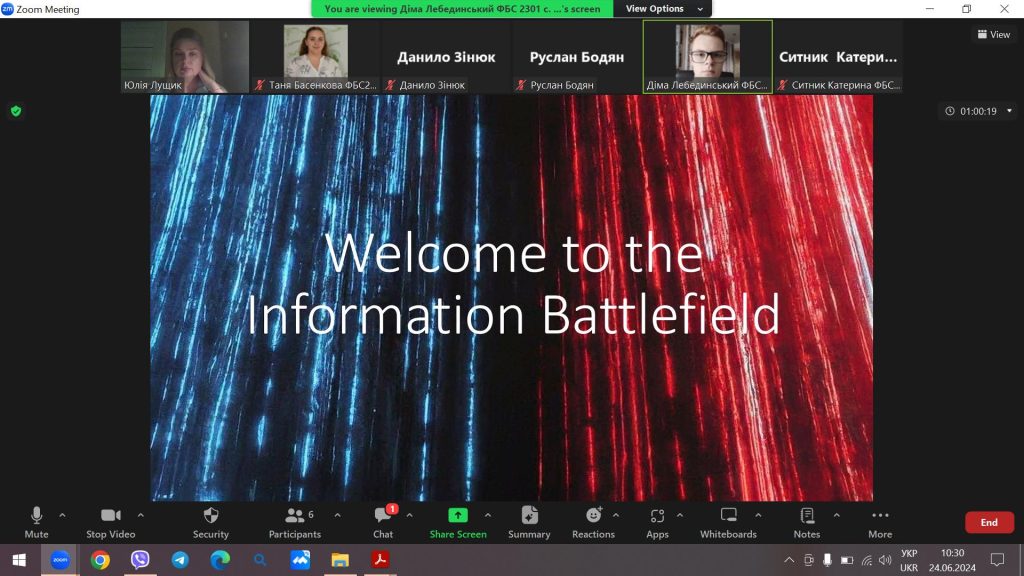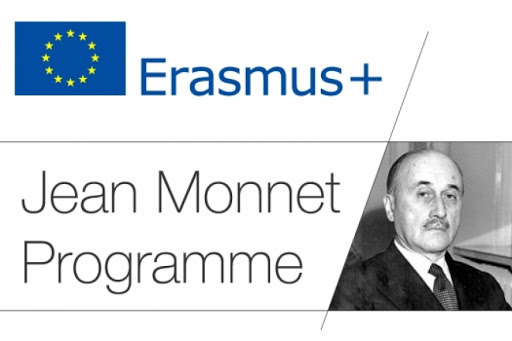The Summer School on Media Literacy, themed “Information Wars: Truth and Fakes,” conducted as part of the project “EU strategies extrapolation for boosting students’ media literacy in Ukrainian HE,” was designed to provide participants with the essential skills to distinguish truth from misinformation in today’s complex media environment. The program aims to empower individuals with the knowledge and tools to recognize, analyze, and combat the impact of propaganda, stereotypes, and manipulative tactics across different media platforms and landscapes.
Organizers, trainers, and speakers were PhD, associate professor of the Department of Foreign Languages Marina Bilotserkovets; PhD, Associate Professor of the Department of Foreign Languages Yuliia Lushchyk; and PhD, associate professor of the Department of Foreign Languages Tetiana Fomenko.
The primary goal of this training program was to enhance participants’ critical thinking skills. The objectives included:
- Developing participants’ ability to critically evaluate information sources and content.
- Understanding propaganda and providing knowledge about the mechanisms and impacts of propaganda and information-psychological operations.
- Combating misinformation by equipping participants with practical skills to detect and counter fake news and misinformation.
- Overcoming stereotypes by educating participants on recognizing and overcoming manipulative tactics in advertising and marketing.
- Encouraging a culture of media literacy and informed media consumption.
Module 1: Information Wars: A Historical and Contemporary Perspective (June 17, 2024 – June 19, 2024; 12 Academic Hours)
This module offers a comprehensive exploration of information wars, delving into their historical origins and modern-day occurrences. Participants gained insight into the development of information warfare, the influential entities involved, and the tactics employed in various contexts. The module encompassed topics such as “Definition and categorization of information wars,” “Historical instances of information warfare,” “The impact of technology and social media on contemporary information wars,” and “Case studies illustrating current information wars.”
Module 2: Propaganda and Psychological Operations: Tools and Techniques in the Information Age (June 20, 2024 – June 22, 2024; 12 Academic Hours)
This module covered propaganda, psychological operations (PSYOP), and their respective tools and techniques used to influence public perception and behavior. Participants explored the definition and purpose of propaganda and PSYOP, techniques of propaganda and PSYOP (e.g., bandwagon, fear appeal, glittering generalities), and the psychology behind propaganda and PSYOP through speakers’ interactive PowerPoint Presentations, debates, and case studies of propaganda and PSYOP in various media (e.g., news, films, social media) and military/political contexts.
Module 3: Breaking the Mold: Addressing Stereotypes and Manipulation in Media (June 24, 2024 – June 26, 2024; 12 Academic Hours).
During this module, participants learned about the prevalence and impact of stereotypes and manipulative tactics in advertising and marketing. Participants engaged in problem-based learning activities including workshops “Common stereotypes in advertising and their societal impact” and “Psychological effects of advertising and marketing on consumers”, interactive media analysis “Strategies to recognize and overcome these stereotypes and manipulations” and collaborative case studies of advertising campaigns that challenge stereotypes.
Module 4: Truth Seekers: Identifying and Combatting Misinformation (June 27, 2024 – June 29, 2024; 12 Academic Hours).
The final module centered on equipping participants with practical skills to detect and counter fake news and misinformation. Key topics included the definition and types of fake news, techniques for verifying the authenticity of information, tools, and resources for fact-checking, and strategies for countering misinformation. These were delivered through problem-based learning and case studies of successful misinformation debunking campaigns.
Throughout the Summer School, participants actively engaged in creating mind maps and PowerPoint presentations within the framework of each module. These activities were designed to reinforce learning by encouraging participants to visually organize information and present their understanding of key concepts. The mind maps allowed participants to draw connections between different ideas and topics discussed in the modules, while the PowerPoint presentations provided an opportunity to practice and enhance their presentation skills, facilitating peer-to-peer learning and feedback.
After the Summer School concluded, participants completed a thorough questionnaire covering the main points of the courses. This evaluation was designed to gauge the program’s effectiveness and how well participants had met the learning objectives. The questionnaire included a mix of multiple-choice questions, short answers, and reflective prompts, allowing participants to demonstrate their understanding and provide feedback on their learning experience. The results will be used to enhance future Summer School sessions and ensure they continue to effectively meet participants’ needs.
In conclusion, the Summer School on Media Literacy «Information Wars: Truth and Fakes» aimed to provide participants with a comprehensive understanding of the media landscape, focusing on critical issues such as information wars and propaganda and their manifestations, as well as manipulative advertising tactics. Participants acquired valuable skills and knowledge to engage critically with the media through interactive modules and activities like case studies, role-plays, mind maps, and PowerPoint presentations. The program’s thorough questionnaire at the end facilitated a comprehensive evaluation of the learning outcomes. On the whole, the Summer School program
and the ways in which it is organized and conducted have contributed to a more informed and media-literate society.





